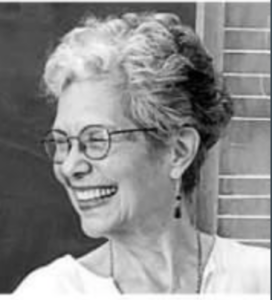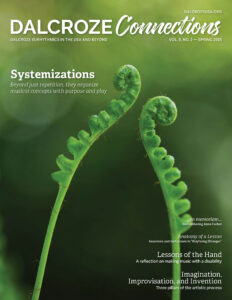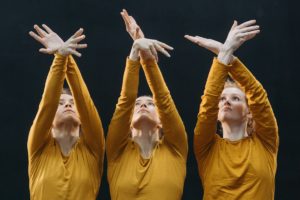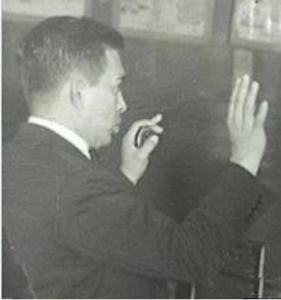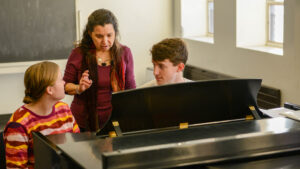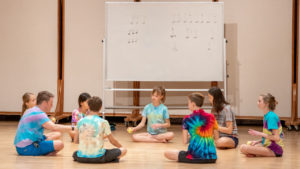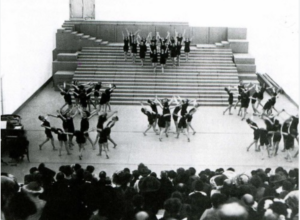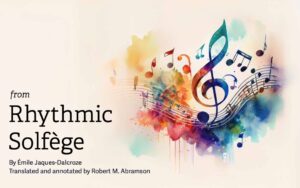Remembering Anne Farber
You may have read in the latest issue of Dalcroze Connections the memories that Dalcrozians shared of their time studying and collaborating with Anne Farber, one of the most formidable Dalcroze educators of our generation. One of the few American holders of the diplôme supérieur, she was the director of the New York Dalcroze School…
Read MoreThe DALCROZE LAB returns!
Have you ever watched a DALCROZE LAB? This is a virtual forum provided by the Dalcroze Society of America for educators to explore Dalcroze Education. It offers both live seminars and on-demand recordings of past presentations. These resources allow participants to delve into the principles, pedagogy, and techniques of Dalcroze education, including workshops, Q&A sessions, and study discussions. In…
Read More“Dalcroze Connections” Vol. 9 No. 2 Now Available
The spring 2025 edition of our online magazine Dalcroze Connections is now available for all to read! Dalcroze Connections is the official magazine of the United States Dalcroze community and seeks to inform, inspire, and educate Dalcroze practitioners at all levels. It is published twice yearly, and prepared by the Publications Committee. This issue was…
Read MoreQuick Reactions with a Dalcroze Teacher: Stephen Neely
In this second in our series of teacher profiles, I caught up with Carnegie Mellon professor and director of the CMU Marta Sanchez Dalcroze Teacher Training Center, Stephen Neely. Michael Joviala: Hi Stephen! Give us your Dalcroze origin story in 50 words or less. Stephen Neely: Oh, wow. 50 words? Ok, I’ll try. I was…
Read MoreProfessional Development Retreat in NYC
The recent professional development committee (PDC) conference held in Manhattan was unforgettable. In the short space of just a weekend, the Dalcrozians who attended were able to experience a wide variety of activities, games, repertoire pieces, and more. We kicked off the conference with a Friday night dinner meeting consisting of Chinese takeout, repertoire sharing,…
Read MoreRepertoire Piece: “Sleep, My Girl,” a Lullaby for Movement
Paulino Paredes (1913-1957) was a prolific and multifaceted composer born in Michoacán (Central México). His compositions range from symphonic works (ballets, solo concerti, and symphonic poems), musical theatre, sacred works for choir and organ, and solo organ, chamber music (lieder, string quartets), and solo piano music. Among his solo piano works, “Duérmete mi niña” (“Sleep,…
Read MoreSabbatical in Switzerland: Institut Jaques-Dalcroze (Part 2)
Note: this is part 2 of a series. Find part 1 here. This article first appeared in The Orff Echo, Volume XVIII, No. 4, Summer 1986. ©1986 American Orff-Schulwerk Association, Mayfield Heights, OH. Used by permission. Scale singing [at the Institut Jaques-Dalcroze] is a daily must. “So what?” one might ask. Here is one example of creative scales:…
Read MoreLesson Plan for 3rd-5th graders
This is a lesson plan I might use in the beginning of the year in a community music school. Where I teach, some students will be brand new to music lessons and Dalcroze, some will be experienced at both, but most will be in between. I try to plan activities that will allow me to…
Read MoreAre You Familiar with the T2 Program?
Have you ever heard of the T2 Program? If not, this article will familiarize you with an outline of this important document which is shaping the future of Dalcroze teacher training in the United States. The T2 program, which symbolizes the two Ts in Teacher Training (and is sometimes pronounced as T-squared and other times…
Read MoreRhythmic Solfège
Translated by Robert M. Abramson Foreword Rhythmic solfège is not in competition with other systems of solfège. It is a complement to them, and an indispensable one. In fact, in the better treatises on the subject, classical or modern, the exercises are given with the sole intention of teaching the laws of pitch and meter,…
Read More